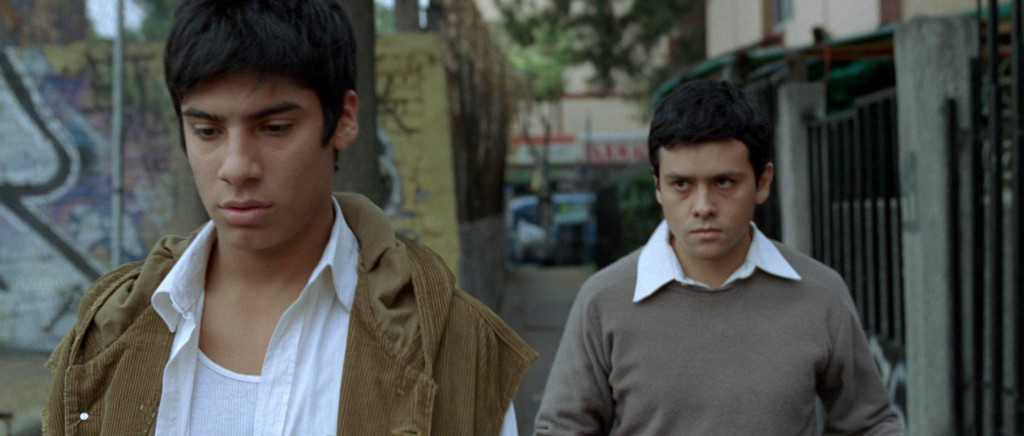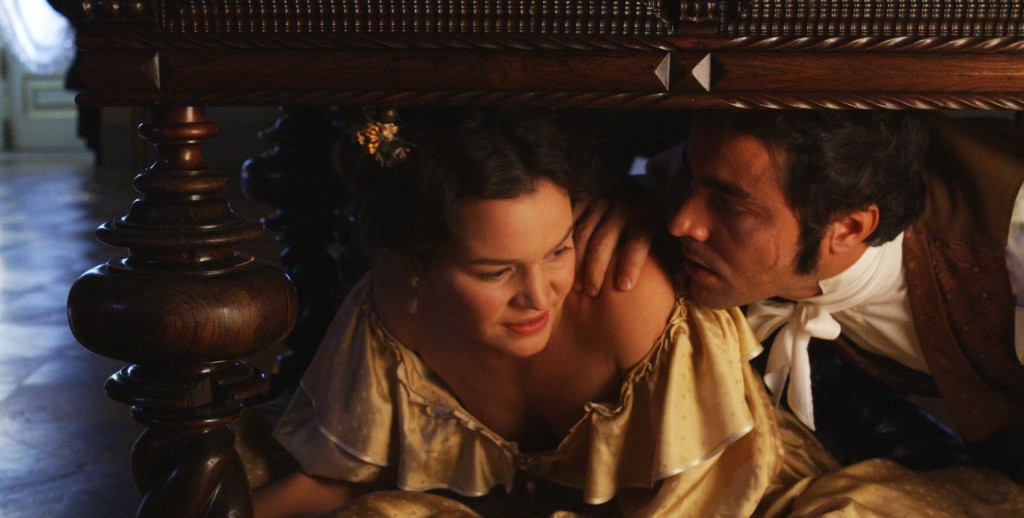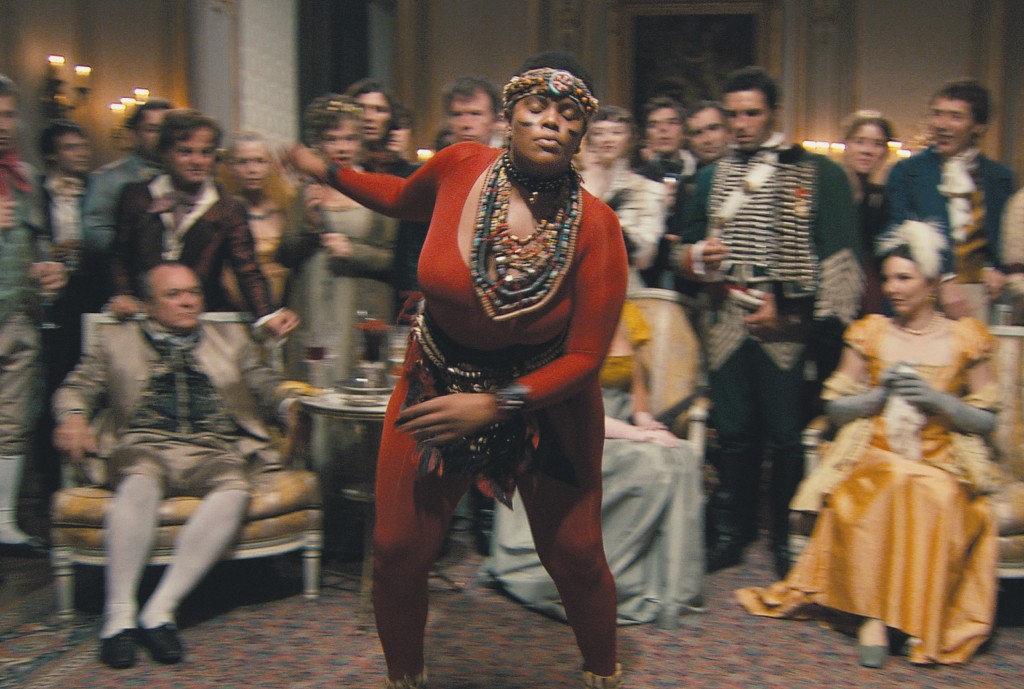Wed 13 Oct 2010
NYFF ’10: Wrapping Up
Posted by Ethan under Film Festivals, Film Review, NYC Film Critic
1 Comment
Closing out coverage of the 48th New York Film Festival with a final batch of capsules. Look for longer reviews of three more movies–Mike Leigh’s Another Year, Julie Taymor’s The Tempest and Clint Eastwood’s Hereafter–closer to their theatrical release dates in December.
Mysteries of Lisbon
Directed by Raul Ruiz
**1/2
A four-and-a-half hour distillation of a six-hour miniseries made for Portuguese television, Mysteries of Lisbon is an immaculately produced historical epic that plays like a cross between Charles Dickens and Alexander Dumas. (The movie is actually based on a 19th century novel by Portuguese author Camilo Castelo Branco, who was a contemporary of both those men.) The labyrinthine plot revolves around a young orphan who has grown up under the watchful eye of a devoted priest, but has finally grown old enough to learn the truth of his origins. We in the audience are treated to his full history—and a whole lot more besides—through an extensive series of flashbacks, as virtually every character that enters the frame comes prepared with his or her own lengthy story to tell. While the repetitive nature with which these flashbacks are introduced is almost laughable at times, it’s hard not to get swept up in the narrative’s broad mix of melodrama, coincidence and sheer luck. That is, at least, until the second half when the orphan morphs into a grown man overnight and the events of his life grow increasingly less compelling. By the time the film winds down to its overdue conclusion, my interest in its titular mysteries had long since worn off.
——————————————————————————————————————————————————————–
Black Venus
Directed by Abdellatif Kechiche
***
Black Venus is a film about exploitation that many might accuse of being exploitative itself. Those critics do have a point—certainly director Abdellatif Kechiche lingers for inordinately long periods of time on scenes depicting the physical and emotional abuse of the film’s central character, Sarah “Saartjieâ€Baartman, a South African woman who performed for European audiences in the early 19th century as the Hottentot Venus.  The act devised by her male employer was pure freak-show stuff; dressed up in tribal garb, she grunted and stamped about for audiences while he ordered her to perform various menial tasks, before inviting audiences to step up and touch her enormous buttocks. One of these shows is presented in its entirely early on and while it’s difficult to watch, it’s also far from the worst of the humiliations she’ll suffer during the course of the film. Later on, she’ll be poked and prodded by scientists eager to examine her unique physical attributes (and use them as evidence in their research into the “inferiority†of African people), fondled and violated at erotically-charged elite parties and, finally, sold into prostitution, the job that led to her eventual death from syphilis at the age of 25. Kechiche presents these encounters in lengthy, unbroken sequences that punish the audience as much as the performer playing Baartman, first-time actor Yahima Torres. And yet, perhaps that punishment is necessary if we’re to truly understand the horror Baartman experienced in her short, sad life. (That said, two-and-a-half hours is an awfully long time to witness this kind of sustained abuse—the movie might have been easier to defend against exploitation charges if it were at least thirty minutes shorter.) If Black Venus upsets you, perhaps that’s a sign that Kechiche has done his job.
——————————————————————————————————————————————————————–

Robinson in Ruins
Directed by Patrick Keiller
**1/2
I generally like my British humor dry, but Patrick Keiller’s essay film Robinson in Ruins is too dry even for me. Perhaps part of the problem is that I haven’t seen the two previous entries in this apparently ongoing franchise, while purports to be the work of a man named Robinson, a fictional researcher who travels around England making various observations about domestic and international events. These observations are imparted to us in narration read by a supposed friend and colleague of Robinson—in this case a role voiced by actress Vanessa Redgrave—which is layered over postcard-perfect (and noticeably depopulated) shots of rural countryside, bustling cities and an occasional bit of action (like a lengthy sequence depicting a spider spinning its web). Keiller demonstrates such a strong eye for composition, it’s easy to tune out Redgrave’s droning narration and just enjoy Robinson in Ruins as a slideshow of beautiful images, which is essentially what I wound up doing. I’m sure I missed out on some great dry wit—to say nothing of the overarching point of the film—as a result, but that’s a loss I’ll just have to deal with.
——————————————————————————————————————————————————————–

Film Socialisme
Directed by Jean-Luc Godard
Your enjoyment (and, to a certain extent, comprehension) of Jean-Luc Godard’s latest provocation depends heavily on whether you’ve kept up with his recent output or still primarily associate him with the groundbreaking movies he made in the ‘60s, from Breathless to Week End. Because if you view Breathless and Film Socialisme back-to-back, you’d probably never guess that the same guy made them. Personally, I’m not as familiar with contemporary Godard as I should be—prior to this one, the most recent film of his I had seen was 2001’s In Praise of Love, which, while challenging, was still slightly more conventional than Film Socialisme. Divided into two distinct parts, Godard’s new film spends its first half on a cruise ship where a gallery of faces—it would be a stretch to call them characters—wanders about staring out at the ocean and occasionally speaking to each other. (Their conversations are just barely translated for our benefit—Godard only chooses to subtitle two or three words per sentence.) In Part Two, the action shifts to dry land and features, among other things, the repeated image of a donkey tied up to a gas pump. What does it all mean? Damned if I know, but then I’m not certain that Godard expects viewers to be able to offer a cogent explanation of everything they’re seeing onscreen. The images seem to be what matter to him, not necessarily their meaning. As you may notice, I’ve declined to give Film Socialisme a rating; that’s because it’s difficult to offer an conventional grade of a movie that seeks to defy convention at every turn. Perhaps a better to summarize my time spent watching it is listing the range of emotions I experienced throughout, from boredom and irritation to fascination and even enjoyment.
——————————————————————————————————————————————————————–

We Are What We Are
Directed by Jorge Michel Grau
**
This Mexican horror drama reminded me in some ways of the Greek movie Dogtooth, released here earlier this year. Both films revolve around families that have removed themselves from mainstream society to pursue their own distinct beliefs. The mother and father in Dogtooth taught their children a unique vocabulary and an odd set of moral lessons. In We Are What We Are, Mom and Dad have instructed their offspring in the fine art of cannibalism. But when daddy dearest kicks the bucket in the beginning of the movie, it’s up to his two sons to carry on the family tradition. Making his feature film debut, writer/director Jorge Michel Grau has hit upon a terrific premise for a film, but doesn’t execute it with the precision and imagination it deserves. The movie is sloppy and slapdash when it should be frightening and darkly comic. In that way, it’s nothing like Dogtooth, which succeeded in all the ways this film fails.
——————————————————————————————————————————————————————–
Revolucion
Directed by Various
***
An omnibus collection of ten short films that offer contemporary observations on the Mexican Revolution (which celebrates its centenary this year), Revolucion contains two great movies, two fairly bad ones and another six that range from mediocre to pretty good. The standouts for me include Carlos Reygadas’ haunting semi-documentary entry depicting a party commemorating the Revolution that turns destructive and Rodrigo Pla’s mournful film about a descendent of Pancho Villa who is unwittingly used as propaganda for an ambitious politician. Interesting, the project’s highest-profile directors (actors Gael Garcia Bernal and Diego Luna, who also produced the film) wind up contributing the weakest segments; Bernal’s in particular feels scattered and unfinished, as if he never completed the screenplay before he began shooting. The rest of the movies all have something interesting to offer even when they’re not entirely successful. There has yet to be an omnibus movie where every individual segment is a winner, but the best entries in Revolucion make the entire picture worth seeing.




Clint Eastwood is an excellent actor/producer/director and important of all an excellent human being!